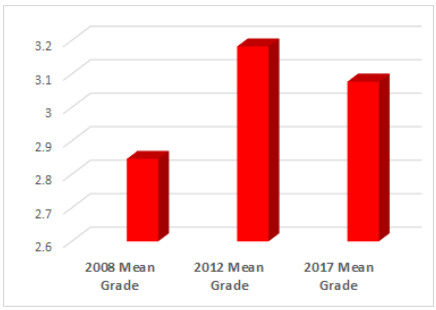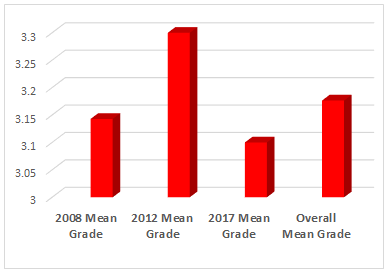AAQEP Accreditation
Standard 2 Aspect D
Standard 2d: Program completers engage in professional practice in educational settings and show that they have the skills and abilitandidates must have broad and general knowledge of the impact of culture and language on learning, yet they cannot, within the context of any given program, experience working with the entire diversity of student identities, or in all types of school environments.
Candidate preparation includes first-hand professional experience accompanied by reflection that prepares candidates to engage effectively in different contexts they may encounter throughout their careers.
Data Sources & Analysis
Data Source 1
Multicultural/International Degree Requirement Course Grades
Description of Data Source:
It is the policy of California State University, Fresno, that all students be prepared
to understand and live in a multicultural and international world through their undergraduate
education. Consequently, all students are required to take a Multicultural/International
(M/I) course at CSU Fresno as a requirement for graduation at the bachelor’s degree
level.
Perspective Captured from Data Source: Instructor
Rationale for using Data Source:
Students completing our bachelor’s degree program in Agricultural Education and subsequently
the Ag Specialist Credential program are required to fulfill the university’s M/I
requirement. This requirement can only be met by successfully completing an approved
M/I course.
It is our expectation that fulfilling this requirement supports our candidates in developing global perspectives they can then incorporate into their work with their students.
Specific Elements of Data Source:
Students’ final course grades from their undergraduate M/I course
Definition of Success for Each Element:
Candidates are expected to receive a grade of “D” (60% / 2.0) grade or better to
meet the university’s M/I degree requirement. Our program goal is for at least the
majority of candidates to meet this learning outcome with a “B” (80% / 3.0) grade
or higher.
Displays of Analyzed Data:
Figure 1: Mean Course Grades in M/I course from 2008, 2012, and 2017
M/I Course Final Grade Mean Summary
| 2008 Mean Grade | 2.85 |
|---|---|
| 2012 Mean Grade | 3.18 |
| 2017 Mean Grade | 3.08 |
Link to Full Dataset: M/I Grade Summary
Interpretation of Data:
The 2008 cohort of Ag Specialist program completers fell slightly below the desired
goal of a “B” (3.0) average with an overall grade mean of 2.85. However, the 2012
and 2017 cohorts did perform notably better as demonstrated by the 3.18 and 3.08 means,
respectively. The data does show that overall the majority Ag. Specialist program
completers included in this study did meet the program’s overall goal of a “B” (3.0)
grade or better in the fulfillment of the university’s M/I requirement.
Data Source 2
Plant 105: Food, Society and the Environment Course Grades
Description of Data Source:
Students completing our bachelor’s degree program in Agricultural Education, a prerequisite
for the Ag Specialist Credential program, are required to fulfill the university’s
upper division General Education area IB (Integration/Science) requirement. Students
are required to complete one IB course, from the university’s approved list of courses. Agricultural Education students typically complete their GE - IB by taking Plant
105, as it is the course that is recommended by their academic advisors and faculty
for this GE area and the most relevant course in this area for our majors. Plant 105
is also recommended on our Agricultural Education degree advising sheet.
Perspective Captured from Data Source: Instructor
Rationale for using Data Source:
The Plant 105 curriculum includes topics related to our world’s population growth, food supply,
sustainability, and food safety. There is also class discussion focused on the balance
between our global population and food supplies.
Specific Elements of Data Source:
Students’ final course grades from their Plant 105 course
Definition of Success for Each Element:
Candidates are expected to receive a grade of “D” (60% / 2.0) grade or better to
meet the university’s GE - IB degree requirement. Our program goal is for at least
the majority of candidates to meet this learning outcome with a “B” (80% / 3.0) grade
or higher.
Displays of Analyzed Data:
Figure 2: Mean Course Grades in Plant 105 from 2008, 2012, 2017
| 2008 Mean Grade | 3.14 |
|---|---|
| 2012 Mean Grade | 3.30 |
| 2017 Mean Grade | 3.10 |
| Overall Mean Grade | 3.18 |
| Overall Std. Dev. | 0.71 |
Link to Full Dataset: Plant 105 Grade Summary
Interpretation of Data:
The results for 2008, 2012 and 2017 show Plant 105 mean grades for our Agriculture
Specialist candidates ranging from 3.10 to 3.30 with an average of 3.18. All three
years yielded a mean grade that exceeded the program goal of 3.0 (“B” grade average
or better), therefore it can be concluded that overall the majority agriculture specialist
program completers included in this study did meet the program’s overall goal of a
“B” (3.0) grade or better in their Plant 105 course.
Next Steps:
Due to university credit limitations, our program is unable to add additional undergraduate
courses. Likewise, our credential course load is 39 semester units and adding additional
requirements would require students to enroll for an additional semester. It is for
these reasons that we draw on the university undergraduate requirements to help our
candidates to develop knowledge of international and global perspectives that they
can then use with their future students. We are open to suggestions about how to improve
in this area.
Moving forward, we will conduct some research to find out what other programs are doing in this area, perhaps by engaging in discussions with our stakeholders and/or adding items to our graduate survey to see how well completers think they are prepared in this area. Additionally, we will look for spaces within our current course syllabi to incorporate global perspectives on issues in agriculture. This may include inviting candidates to bring in learning from the undergraduate courses we have cited here to support them in linking that learning to the work they do with their students.
To evaluate our efforts in this area, we will continue to analyze the data we collect each year and discuss as program faculty how we might improve the scores of our candidates.